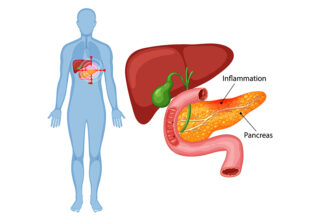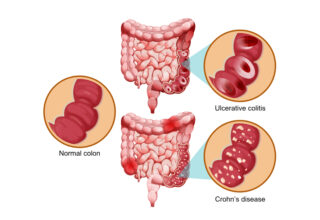Coeliac disease is a common disease that affects around 1 in 100 people in Ireland. However, many people with coeliac disease remain undiagnosed and unaware that they have this condition.
Let’s learn what coeliac disease is, how it shows up, what causes it, and what you can do to manage it.
What is Coeliac Disease?
Coeliac disease is a long-term autoimmune condition that causes damage to the small intestines (gut). It makes your immune system attack your body’s own tissues when you eat gluten—a dietary protein found in wheat, barley, and rye, which is normally healthy and safe to eat. It’s not a food allergy or intolerance to gluten.
As coeliac disease causes damage to the lining of your small intestines, it prevents the absorption of nutrients from your gut and causes a condition called malabsorption.
Symptoms of Coeliac Disease
When people with coeliac disease eat gluten, they can experience a range of symptoms from mild to severe, which often come and go. These symptoms include:
- Diarrhoea (that smells particularly unpleasant)
- Stomach ache
- Bloating
- Flatulence (farting)
- Indigestion
- Constipation
Coeliac disease can also cause other symptoms like:
- Unintentional weight loss
- Tiredness and fatigue (due to malabsorption of nutrients)
- An itchy rash (dermatitis herpetiformis)
- Loss of sensation in fingers and toes (peripheral neuropathy)
- Headaches and migraines
- Persistent mouth ulcers
- Feeling generally unwell
- Difficulty getting pregnant or infertility
What is Asymptomatic Coeliac Disease?
Asymptomatic coeliac disease, also called as silent coeliac disease is a type of celiac disease in which a person has an autoimmune reaction to gluten that damages their small intestines, but it doesn’t cause any noticeable symptoms.
These people are usually not diagnosed due to any symptoms, but due to an increased awareness and screening of celiac disease.
What Causes Coeliac Disease?
It’s an autoimmune condition in which the immune system mistakes one of the substances in gluten called gliadin as a threat to the body and produces antibodies against it.
This overreaction causes damage to small finger-like projections in the small intestines—called villi. These villi absorb nutrients from the food you eat and when they get damaged your body can’t absorb the nutrients, no matter how much you eat.
The exact cause why your immune system reacts this way is not known. However, a combination of genetics and environmental factors seem to play a role.
Risk factors
There are some factors that make people more at risk of developing coeliac disease. These include:
- A family member with coeliac disease or dermatitis herpetiformis
- Autoimmune thyroid disease
- Type 1 diabetes
- Turner syndrome
- Down syndrome
- An infection of digestive system (like rota virus) in the early childhood
How Coeliac Disease is Diagnosed?
To diagnose celiac disease your doctor would take a complete history and recommend blood tests. These blood tests may include serology testing to look for antibodies that indicate immune reaction to gluten and genetic testing for human leukocyte antigen (HLA-DQ2 and HLA-DQ8) to rule out coeliac disease.
Your doctor might also recommend an endoscopy or biopsy.
If coeliac disease has been diagnosed then a few further tests would also be recommended to check your iron levels and other vitamins and minerals in your blood. A bone density scan might also be suggested to check your bone density.
If someone in your family is diagnosed with coeliac disease, your doctor will likely recommend screening for you and all the close relatives. This’ll help diagnose people with coeliac disease who don’t have any symptoms.
Management of Coeliac Disease
The only way to manage coeliac disease is to avoid gluten and have a gluten-free diet for the rest of your life.
Gluten can be found in any food that contains wheat, barley, and rye. These foods include:
- Pasta
- Breakfast cereals
- Cakes
- Most types of bread
- Biscuits
- Certain sauces
- Packaged foods
- Malt
- Graham flour
- Semolina
Gluten can also be hidden in other foods, non-food items, and medicines, which include:
- Modified food starch
- Preservatives
- Some over-the-counter or prescription medicines
- Nutritional supplements
- Certain makeup products
Before buying any packaged foods, make sure to carefully read labels. It should be mentioned that they’re gluten-free or don’t contain gluten.
Removing gluten containing food from your diet will help reduce inflammation in your small intestines and relieve your symptoms. A dietician can help you plan for a healthy gluten-free diet.
If you have anemia or nutritional deficiencies due to celiac disease, your doctor may recommend supplements like copper, folic acid, iron, vitamin B12, vitamin D and K, and zinc.
You can also find help and support for coeliac disease and other gluten related conditions from organisations like Coeliac Society of Ireland.
Complications of Coeliac Disease
Untreated and undiagnosed coeliac disease can cause many complications. There’s a misconception that a small amount of gluten will not do any harm, that’s not true. Even a little gluten taken by people suffering from coeliac disease can cause symptoms and increase the risk of developing complications. These include:
-
- Malabsorption (as your body doesn’t fully absorb nutrients) leading to conditions like iron deficiency anemia, vitamin B12 or folate deficiency anemia, and osteoporosis
- Malnutrition (due to critical lack of nutrients in your body)
- Lactose intolerance
- Cancers—including small bowel cancer, small bowel lymphoma (a rare but serious complication of coeliac disease), and Hodgkin lymphoma.
However, if you follow a gluten free diet for some time, your risk of developing these cancers becomes the same as that of any other person without this condition.
Final Thoughts
Coeliac disease is a common condition but with the right diagnosis and strict gluten-free diet, most people are able to live a full and healthy life. Awareness is very important, as many people stay undiagnosed for years and think their symptoms are due to something else.
If you or someone in your family has persistent digestive issues, or belong to a high-risk group, it’s worth seeking medical advice from your doctor.
With proper medical care and support, you can take care of your gut and avoid complications.








